Pavilion Energy Singapore Pte. Ltd. (Pavilion Energy) has imported a carbon-neutral LNG cargo into Singapore – the first for Singapore and Pavilion Energy.

Carbon emissions associated with the LNG cargo from well-to-tank1 including the extraction, production, transportation, and regasification will be offset by retiring a corresponding amount of high-quality carbon credits sourced from its portfolio of carbon offset projects.
The carbon credits used for the offset are from Natural Climate Solutions projects certified under the Verified Carbon Standard (VCS) and Climate, Community and Biodiversity Standard (CCB) - Evio Kuinaji Ese’Eja Cuana in Peru and Liangdu Afforestation in China. Both projects are designed for the protection and restoration of forests, and promote co-benefits through supporting local communities and protecting biodiversity.
Mr Frédéric H. Barnaud, Group CEO of Pavilion Energy, said, “This carbon neutral cargo is another important milestone for Pavilion Energy in our ambition to provide cleaner energy and develop our carbon trading activities. Our aim is to support our customers in their transition towards a lower carbon future with solutions to meet their climate targets and potential regulatory requirements.”
*1- Assuming an average LNG cargo size of 70,000 tonnes, the ‘well-to-tank’ emissions is approximately 60,000 tonnes of carbon dioxide equivalent (CO2e).
About Evio Kuinaji Ese’Eja Cuana Project
The Evio Kuinaji Ese’Eja Cuana (Infierno) project works to protect 7,750 hectares of forest in the Peruvian Amazon through engagement with the local indigenous community of Infierno. This project not only contributes to the well-being of the Infierno Native Community, it also protects critical habitat for hundreds of unique species including those of high conservation value and endangered species, such as the Black Caiman, Giant Otter and Harpy Eagle.
Potential Sustainable Development Goals include: 1 (No Poverty), 2 (Zero Hunger), 5 (Gender Equality), 8 (Decent Work and Economic Growth), 9 (Industry, Innovation and Infrastructure), 10 (Reduced Inequalities), 12 (Responsible Consumption and Production), 13 (Climate Action), 15 (Life on Land), 16 (Peace, Justice and Strong Institutions), 17 (Partnerships for the Goals).
About Liangdu Afforestation Project
The Liangdu Afforestation project is located in Guizhou Province of China and involves the planting of native species on barren land, covering 23,720 hectares. This project not only provides employment for the local communities, it also protects endangered or vulnerable species, such as the Francois’ Leaf Monkey.